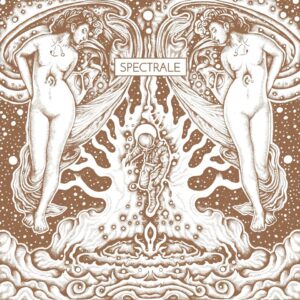
Les acteurs de l’ombre is a respected, French black metal label that is bravely fighting the tide of identikit, uninspired mainstream metal and putting its resources into releasing works by sonic adventurers, whose life’s work is to inspire rather than be inspired. I have reviewed no small number of albums from the label, and each has been a unique representation of black metal, underscoring the ethos of originality with which the genre was started, rather than treating the wind-tunnel guitars and unearthly shrieks of its originators as gospel. A perfect example of this stretching of boundaries can be found in the luminescent sounds of Spectrale, a French musical collective whose achingly beautiful ambient excursions draw upon the likes of Pink Floyd, Ulver and even Philip Glass. As such, there is little that can be safely called extreme about the album save the fact that the music goes against all notions of the mainstream and carves out its own small niche amidst the windswept landscape of Bordeaux, from where the band originate.
From the outset, Spectrale recall James Blackshaw, the classical guitarist whose album ‘the glass bead game’ operates along similar neo-classical lines. ‘Andromede’, the delicately-phrased opening track sees the guitars of Jeff grimal and Jean-Baptiste Poujol darkened with the rich, sanguine sound of Raphael Verguin’s cello, the resulting sound echoing and re-echoing through the space that it seeks to evoke. Lighter of touch, ‘contact’ is a thing of shimmering, unadulterated beauty. The recording is crystal clear and the string scrapes can be heard as the guitarists shift frets, whilst judicious use of reverb allows the music to stretch to infinity and beyond. Yet, it is a short track and one that gives way to the darker tones of ‘attraction’, a piece that incorporates layers of post-rock noise and Pink Floyd-esque wordless vocals (courtesy of Krys Denhez), the latter proving to be perfectly layered and evocative of some far-flung wonder. With a folk-lilt, ‘Landing’ is a lovely piece of music that gives way to soaring electric lead that recalls the grandeur of latter-day Opeth coupled with the evocative soundscapes of King Crimson. It is a mesmerising piece of music and one that captures the alien sense of a distant planet. An album highlight, the dreamy ‘magellan’ couples ethereal grandeur with a hint of menace, storm clouds looming amidst the dark chords and feedback and alien synths threatening to obscure the organic guitar work altogether.
The second half of the album emerges with the nimble picking of ‘monocerotis part 1’, a short and delicate piece of post-rock that draws upon the likes of Red Sparrowes for inspiration. As the piece progresses, so the lines become blurred, the overlapping guitar work and the lush reverb creating a tsunami of notes that threaten to overwhelm, only for the cello to return as guide. ‘Monocerotis part 2’ directly follows, the gorgeously rich sound of the cello remaining the firmest guide through the tangle of notes until we reach [triangle], a track expressed only in terms of a symbol, whereupon Leo Isnard adds drums to the equation, driving the track forward towards a more typical post-rock sound pitched somewhere between Opeth and Mogwai. Another highlight, it is the track most likely to garner attention outside the context of the album, although its impact is most certainly all the greater for being considered a piece of a greater whole. The album concludes with ‘retour sur terre’, a fitting coda that is spread over nine minutes, serving as a strangely abstract end to a journey filled with incident. Most reminiscent of Pink Floyd’s expansive ‘saucerful of secrets’, it is a strange and unsettling conclusion.
Music is an artform that can touch the listener deeply. It can evoke images and emotions, recall events to the mind and draw one away from the humdrum existence of modern life to a place altogether more magical. It can be simple and exciting, or complex and abstruse; but always, when faced with genuine innovation, the result is an involvement that more than repays any personal investment of time or energy one might make. Spectrale’s latest album is a perfect example. It is a journey into the unknown and it stimulates the listener to create their own imagery, whilst the music – strange, alien, exotic – provides a haunting soundtrack. Unlike film, which indelibly burns its images into the brain, music allows for greater variance and your response to Spectrale is likely to be very different to mine, albeit no less vivid. Best heard as a complete piece, ideally with the lights dimmed low, [triangle] is a remarkable album and another testament to the judgement of Les Acteurs De L’ombre productions. 9



